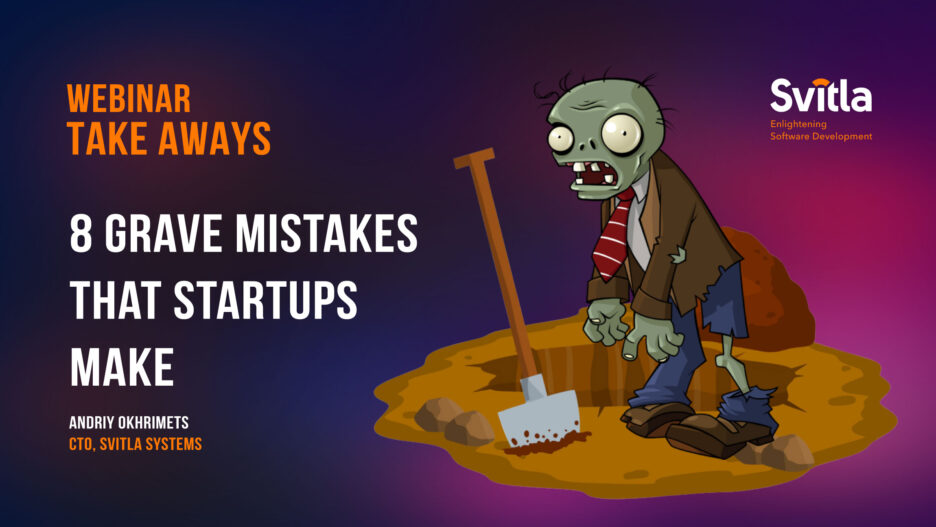Even though startups are responsible for pumping billions of dollars into global economies, research shows that 90% of startups fail. Understanding why most startups fail is a valuable benchmark to avoid some of the most common mistakes.
To dot all the i's on the matter, we asked Andriy Okhrimets, CTO at Svitla Systems, to share his rich experience based on working with 40+ startups which earned him a front-row seat to the successes and failures that make or break a startup. In the webinar “8 Grave Mistakes that Startups Make”, he addressed many product stories showing impressive, successful, unexpected examples of various reasons why startups strive or fail.
In this article, we shortly go through his presentation to give you a glimpse at the presented content, and should you like to request a video recording - let us know in the CTA form below.
So let’s dig in!
Startups face many paradoxes; they need to be nimble yet have a robust foundation. They thrive on agility yet they also benefit from having well-structured processes. They need to adapt to changing business demands yet they have to stay within budgetary boundaries. As there’s a lot of value in learning from others’ mistakes, we’ve listed 8 grave mistakes that startups make and face failure so that you know what to avoid.
1. No SME experts on deck. Launching a startup is not just about having a great idea for a product or service; you also need to look at the operation from a technical, practical, and business-savvy perspective. Subject Matter Experts possess those unique perspectives thanks to rich experience in niche domains, helping define the true value and key differentiators that your solution will offer.
2. Don't make assumptions. It's easy to assume that your solution will trump all others. Successful startups have many things in common, and one of them is in-depth market research to understand customer pain points to learn more about what will solve those problems in an innovative way.
3. Do the math. Putting a product or service to market is no easy feat. When building something from scratch, you need to take a hard look at both costs and time investments. While MVP development can be inexpensive, the full-blown development of a complete product usually takes a significant toll on the budget and time resources.
4. Extra detail-oriented mindset. Failed startups often focus on hundreds of perfectly done features, which can take a significant amount of time to develop. Instead, focus on perfecting 1-2 features that are mission-critical and then iteratively improving them to achieve the most value to potential users.
5. Lack of focus. When a product tries to address ALL issues of potential users at once, it’s a recipe for disaster. The goal should be to prioritize and focus on what’s mission-critical to differentiate your product from others already in the market.
6. Plan to launch. Don’t fall into the trap of thinking your product is ready for the market once you finish development. Remember, areas like Marketing, Design, User Acquisition, Account Management, and many more, can sometimes be way more important than the product itself.
7. Choose the right tech stack. While some technology looks good on paper, it may not be effective for the purpose of your startup. A common mistake seen on even some of the most tech-savvy CTOs and senior engineers is to select a technology stack that could potentially solve niche problems but has a limited resource pool of engineers who are familiar with this technology.
8. Build a dream team. Startups often turn to cheap software development providers to staff their operations, but this can quickly backfire and become a hindrance to the success of your company. Find the right balance of talent and budget so you hire proficient developers that don’t break the bank but are proficient at delivering great code.
If you’re interested in more details fill in the form below and we will gladly share the record of the webinar with you!





